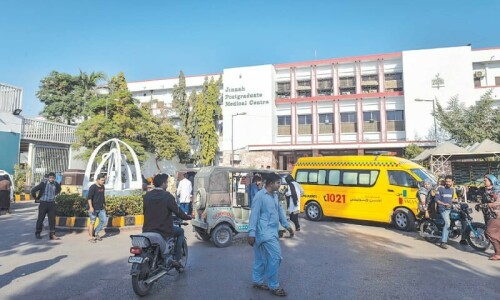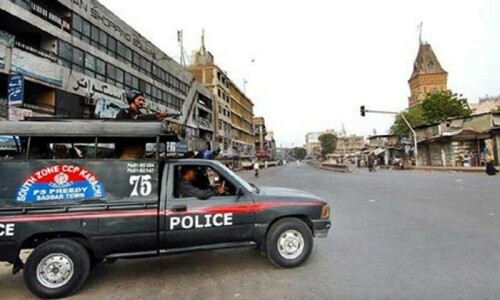KARACHI, Jan 6: People travelling in public transport may continue to suffer as the Sindh government has no immediate plans to provide relief to them though transporters have offered to operate vehicles efficiently if they are given subsidised diesel, it emerged on Sunday.
The government’s lack of interest in solving the problem is evident from the fact that it has not held even a single meeting with transporters since the start of the crisis four months ago, when CNG prices were reduced significantly on supreme court orders and, subsequently, CNG station owners refused to do business on the reduced price. This, unfortunately, happened at a time when the nation was already experiencing gas shortages.
“The SC move aimed at providing relief to the public has instead turned into a daily ordeal, especially for those travelling in public buses, most of which remained off the road on account of CNG station closures,” said a group of commuters waiting at a bus-stop on Sharea Faisal.
“We spend endless hours waiting for a bus and when it arrives passengers are crammed into the vehicle like animals or they risk their lives by travelling on its rooftop. Women and the old suffer the most as they wait for another bus in the hope that that might accommodate them with relative comfort.
“Taxi and rickshaw drivers take advantage of the situation and demand high fares arguing that they are using costly petrol, diesel or LPG (liquefied petroleum gas),” said another.
Commuters condemned the government for showing lack of urgency in resolving the issue and said the daily suffering was affecting their health and productivity at work and home.
They also complained that the continued CNG crisis was encouraging unsafe transport. In this regard, they referred to the increasing number of illegal Qingi rickshaws and the sale of substandard cylinders for LPG use in the market.
When contacted, Irshad Bukhari of the Karachi Transport Ittehad said it was not just commuters who were suffering; transporters, too, were going through a difficult time and the key to the solution was in the government’s hands.
“The government is blind and deaf. It has no interest in public welfare else solutions are available to every problem,” he said.
Transporters’ predicament was that they had invested large amounts of money in CNG conversion and were reluctant to return to the use of diesel because of uncertainty.
“They have spent Rs100,000 to Rs300,000 on CNG conversion because they were suffering losses because of constant increases in diesel prices. And again they are in a loss because their vehicles remain standing for three to four day of the week.
“Buses are not like cars that you could run on both diesel/petrol and CNG. You have to choose one fuel system,” he explained.
When asked about the solution, Mr Bukhari said transporters would operate their vehicles if the government provided subsidised diesel to them if not compensation for the cost on CNG conversion.
“Diesel was Rs44 litre four to five years ago and now it’s Rs115. We can’t force any one to bring their vehicle on the road, but if the government gives us diesel at Rs80 to Rs85 a litre, I think there is a strong prospect that the common man would get immediate relief. I assure you that transporters would try to meet the losses suffered for CNG conversion by taking loans,” he said.
The transport minister was not available for comments.
Answering a question about subsidised diesel, project director and focal person of the transport department Yar Mohammad said gas shortages existed in the entire country and only the federal government could take a decision on subsidised diesel as it was a federal subject.
“It requires billions of rupees which we don’t have. Besides, if subsidised diesel is provided to public transporters in Karachi, truckers would also demand the same and, at the next step, such a demand could emerge in other provinces. The government is trying to resolve the pricing issue and it is hoped that it will be fixed in the coming days,” he said.
The government, he said, had plans to make the Karachi circular railway functional and to run public transport on public-private partnership, but it needed time. “The government will give 20 per cent subsidy to investors in the urban transport scheme, and preparations are under way to launch the programme,” he said.
Wasay Jalil and senator Abdul Haseeb Khan, both representing the Muttahida Qaumi Movement, blamed the government for the crisis and said their party had raised the issue at all levels.
“The crisis has developed mainly because the government allowed the use of CNG to all and sundry. Now there is a gas shortage even for domestic use,” said Wasay Jalil, adding that only public transport should be allowed to use CNG.













































Dear visitor, the comments section is undergoing an overhaul and will return soon.